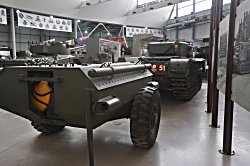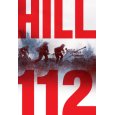

Hill 112
The eightieth anniversary of D Day will fall on 6th June 2024 and will no doubt be marked with ceremonies of remembrance, even though the passage of time means that sadly few survivors of the battle will be left. Living memory is fading as the wartime generation passes – just as the First World War survivors dwindled away several decades ago, and no doubt those of Waterloo did a century earlier.

D Day is remembered as a dramatic, decisive event and a simple victory. What followed tends to be forgotten, at least in the popular consciousness, as the fighting to secure the beachhead and drive inland became a gruelling battle of attrition, lasting for the best part of three months at far greater cost in lives. These were First World War battles of attrition fought with far more lethal weapons. Progress was slow and casualties so appallingly high that the British and Canadian armies came close to running out of replacements for the combat arms and most of all the infantry. The life expectancy for an infantry subaltern was lower in Normandy in 1944 than it had been on the Somme in 1916. Yet in our imagination, the Great War was the bloodbath, its battles far more nightmarish and pointless than any that followed. While it is true that from 1939-45 Britain suffered only a third of the deaths of the Great War, for those actually fighting the risks were every bit as high. Modern warfare placed many in jobs well away from the fighting, but little had changed for those actually facing battle.
There have been plenty of non fiction books about the D Day and the Battle for Normandy and some of them are very good, just as there are many memoirs written by participants. Strangely, novelists have barely touched on it, tending to prefer the setting of the First World War, with its mud, poets and poppies. A few books came out in the decade or so after 1945, but they were written by authors who were there for an audience that had been there and most have been unfairly forgotten. There were no more novels about this, nor were there British films or TV series about what happened after D Day, in contrast to all the stories of the War at Sea, POW camps, Spies, commanders and the glamorous aeroplanes and dogfights of the RAF. For most people, Britain's Second World War was about almost everything apart from grim battles on land.
Hill 112 is a novel about the experiences of a few young British soldiers in the Battle for Normandy. My aim is to capture what it was actually like for those who there – as an author who wasn’t there for readers who were not either. A good novel can get the feel of an era and a situation quicker and perhaps even better than straightforward history because it is about the little human things and must describe everything.
An American Historian wrote a bestselling history dubbing the men and women of the Second World War as the ‘Greatest Generation’. The further we get from the events, formal commemorations dub everyone as heroes, and ignore any veterans who tell them that this is nonsense. The truth is that they were ordinary people living through extraordinary times and having to do extraordinary things. They were from a different generation, their attitudes shaped by society of the time, by the great melting pot of the army and then by the raw experiences of battle.
Released in Hardback and e-book on 23rd May 2024 and Paperback on 5th December 2024.
 Hill112 spread | Published by Head of Zeus (23 May 2024). |